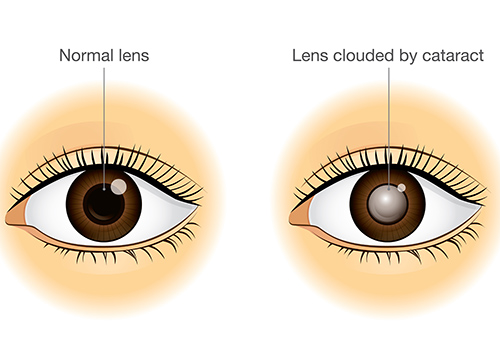NCH Day Surgery Center offers state-of-the-art cataract removal for better vision
June 8, 2018
Q & A with Ophthalmologist Smajo Osmanovic, M.D., Ph.D.
According to the American Academy of Ophthalmology, cataracts affect more than 24.4 million Americans age 40 and older. By age 75, about half of all Americans have cataracts. Cataract surgery is the most commonly performed surgery in the United States. Each year, more than 3 million people in the U.S. will opt for cataract surgery.
Smajo Osmanovic, M.D., Ph.D., who specializes in glaucoma and cataract surgery, answers important questions about cataracts and explains how undergoing cataract surgery at the NCH Day Surgery Center can help you to see clearer.
What is a cataract?
After age 40, there are gradual changes in the natural crystalline lens of the eye. Proteins in the lens start to break down over time, and in doing so cause a gradual clouding of the lens.
How can you tell if you have a cataract?
You can have blurry vision with difficulties reading, writing and driving. You may not be able to see street signs and license plates, and nighttime driving may be difficult. You might also have worsening glare and an increased dullness in your color perception.
What are the latest technologies used to perform cataract surgery at NCH?
Cataract surgery is done with phacoemulsification technology that uses ultrasound energy to break down the cataract. At the NCH Day Surgery Center, we have one of the top-of-the-line phacoemulsification machines, as well as femtosecond laser designed for laser-assisted cataract surgery.
How is cataract surgery performed?
We start cataract removal by making a small incision in the cornea, the front part of the eye. We then enter the eye with instruments to make an opening in the lens capsule. The phacoemulsification instrument is then used to break the cataract into small pieces which are aspirated. After removal of the cataract, an artificial lens made of acrylic plastic or silicone is placed into the eye.
A common misconception is that we can remove a cataract from the eye using laser only. We only use femtosecond laser technology to help us during some parts of cataract surgery. For example, laser could be used to make very precise corneal incisions and a circular opening in the lens capsule as well as softening of the hard portion of cataract. All other parts of surgery have to be done manually.
How much time does this take?

Most of the cases take 15 to 20 minutes spent in the operating room with a total time of usually less than two hours in the surgical center.
What is the recovery like?
For the first week, patients wear a transparent shield over the operated eye during sleep to prevent them from touching or rubbing the eye. They need to use eye drops for three to four weeks. We see patients the first day, one week and one month after surgery to follow up.
Are there benefits to laser use in cataract surgery?
The laser creates very precise incisions in the cornea that can correct the astigmatism, abnormal corneal curvature, during cataract surgery. In some high-risk situations, like advanced cataracts or existing corneal disease, the laser can soften the cataract and thus reduce the energy used. This is good because the cornea could be damaged if you use a lot of energy. Laser is advantageous in those situations.
How many cataract procedures do you perform?
My average in the NCH Day Surgery Center is about eight to 10 surgeries per week.
Are there differences in the outcomes of laser vs. manual cataract surgery?
Several studies have shown that outcomes of standard and laser-assisted cataract surgery are similar.
What is the one thing you hear from patients after cataract surgery?
They tell me that they are delighted with sharper vision and brighter colors and that they wish they would have done the surgery sooner.
Dr. Osmanovic practices at Arlington Eye Physicians, 1604 West Central Road in Arlington Heights. He performs cataract surgery, glaucoma surgery and other eye-disease related procedures at the NCH Day Surgery Center, 800 W. Central Road in Arlington Heights.
To schedule an appointment with an ophthalmologist on staff at NCH, please call 847-618-4968.
Learn about NCH’s ophthalmology partners